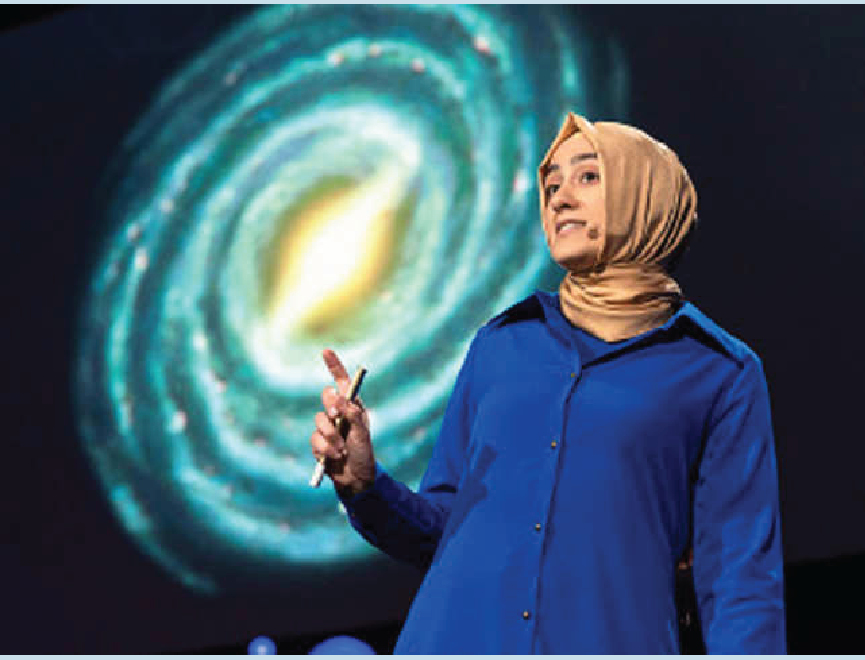
 Print
Turkish Muslimah Scientist Discovered A New Galaxy And Its Now Named After Her
1-21-2020
As a little girl growing up in Turkey, Burçin Mutlu-Pakdil loved the stars.
“How is it possible not to fall in love with stars?” wonders Mutlu-Pakdil. “I find it very difficult not to be curious about the Universe, about the Milky Way and how everything got together. I really want to learn more. I love my job because of that.”
Just a few years ago, in 2016 Burcin -An astrophysicist at the University of Arizona and her team discovered a galaxy, called PGC100714, which has been nicknamed after her. The galaxy has some special characteristics.
A special galaxy?
Usually galaxies are seen as spirals, like our own Milky Way. There are rare ones, about one in a thousand that look different — a small nucleus of stars, with an outer ring some distance away. The first ring galaxy that was discovered was Hoag’s Object.
Why is that special?
It is yet to be explained how the outer ring stays attached to the inner one. Now, Burcin’s Galaxy is even rarer. It seems to have a third intermediate ring in between, making it just one of its kind.
How far is it from us?
It’s 359 million light years away. 
The object was originally detected by Patrick Treuthardt, who was observing a different galaxy when he spotted it in the background. It piqued the astronomers’ attention because of an initial resemblance to Hoag’s Object. This rare galaxy is known for its yellow-orange center surrounded by a detached outer ring.
“Our object looks very similar to Hoag's Object. It has a very symmetric central body with a very symmetric outer ring,” explains Mutlu-Pakdil. “But my work showed that there is actually a second ring on this object. This makes it much more complex.”
Through extensive imaging and analysis, Mutlu-Pakdil found that, unlike Hoag’s Object, this new galaxy has two rings with no visible materials attaching them, a phenomenon not seen before. It offered the first-ever observation and description of a double-ringed elliptical galaxy.
Mutlu-Pakdil and her colleagues suspect that this galaxy was formed as some material accumulated into one massive object through gravitational attraction, AKA an accretion event.
“In such a vast universe, finding these rare objects is really important,” says Mutlu-Pakdil. “We are trying to create a complete picture of how the Universe works. These peculiar systems challenge our understanding. So far, we don't have any theory that can explain the existence of this particular object, so we still have a lot to learn.”
She began her academic career by receiving her B.S. degree in physics from Bilkent University in Turkey, and master’s degree from Texas Tech University. She obtained her Ph.D. degree in Astrophysics from the University of Minnesota-Twin Cities. In August 2017, she joined the Astronomy Department and Steward Observatory at the University of Arizona.
She actively serves on many organizations (e.g., American Astronomical Society, Tucson Women in Astronomy, and many more) to improve the climate for women and other minorities; She likes giving back to the community through impactful educational media programs intended to show that science can be both enjoyable and reachable for anyone, especially for women and other minorities.

Her grandparents lived their lives in small farming towns, and they even did not have a chance to learn how to read or write. Her parents grew up in these small towns. Due to the economic pressures, they were expected to support their families. At those years, most students in their towns were in elementary school until they were eighteen years old. They did not have any role model or any support from parents, and they were mostly busy with house or farm chores. Her father was different, as he was so successful that he skipped a grade in elementary school. But, unfortunately, he was forced to drop out of school after the fifth grade to take care of his parents.
She Says, “My mother also dropped out of school after the fifth grade because women were not supposed to have any higher education than that in her small town. My parents' experiences motivated me to do whatever it takes to live my dream, but my path was not easy. My family had been criticized for "letting" me move away for my education because "Young women should not live away from the family". Faculty members and advisors are really important for first-generation students to realize their potential.
Unfortunately, I did not receive the necessary support structure. On the first day of college, a male professor questioned my presence in the department by saying "Are you crazy? You are a woman, and you left your hometown to study physics?". In each of these challenges, I reminded myself that I do not want to blend in, I want to stand out, so I fought against all these stereotypes and worked hard to live beyond the labels.”
Footnotes:
|